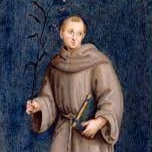 The Church today honors the memory of the Franciscan priest St. Anthony of Padua. He is widely acclaimed and very popular, although it is a sadness that he invoked by many today only when they have trouble finding lost objects! Our celebration of his Feastday is only complete when we remember (and thank God) for the powerful witness of his life and his preaching.
The Church today honors the memory of the Franciscan priest St. Anthony of Padua. He is widely acclaimed and very popular, although it is a sadness that he invoked by many today only when they have trouble finding lost objects! Our celebration of his Feastday is only complete when we remember (and thank God) for the powerful witness of his life and his preaching.
After initially joining the Augustinian Order, he concentrated on reading the Bible and the Church Fathers (Patristic authors), while living a life of asceticism and heartfelt devotion to God. Over time, he was attracted to the poor and humble way of the Franciscan Order. His prayer confirmed his desire to follow the example of St. Francis, who was still living at the time. He eventually obtained permission to leave the Augustinians and join a small Franciscan monastery in 1221. At that time he took the name Anthony, after the fourth-century desert monk St. Anthony of Egypt.
At one point, St. Anthony ended up near Assisi. He so desired to stay near the birthplace of the Order that he deliberately concealed his deep knowledge of theology and Scripture – and he offered to serve in the kitchen among the brothers. By God’s grace, one day he was asked to deliver a talk and his eloquence stunned the crowd, and St. Francis himself soon learned what kind of man “the dishwashing priest” really was. St. Anthony was given permission to teach theology throughout the Order. Known for his bold preaching, his effective teaching, and austere lifestyle, he remains so much more than “the patron of lost objects!”
***
El portugués San Antonio de Padua es uno de los santos más venerados y es uno de los más queridos por los católicos en el mundo … y probablemente también más “abusados.” Es una gran tristeza que hay muchos que piden su intercesión solamente cuando no pueden encontrar sus llaves y otras cosas “perdidas.”
En los diez años que vivió en la Orden de los Agustinos, se dedicó seriamente al estudio de las Escrituras; pero se sintió entonces atraído por el estilo de vida, radicalmente Evangélica, de la joven Orden de los Franciscanos. Se hizo Franciscano. En Italia llegó a ser un predicador muy efectivo y popular. Se dedicó a su misión de predicador con tanto ardor y celo que, desgastado, murió a los 36 años, en Padua. No solamente predicó el Evangelio, sino que lo vivió radicalmente.
Oremos. “Dios nuestro, San Antonio de Padua estaba tan lleno de tu Hijo y de su Evangelio que no podía menos de entusiasmar a la gente acerca de la Buena Noticia de Jesucristo. Te rogamos que tu Hijo y su palabra crezcan fuertes en nosotros, de tal modo que vivamos la vida de Jesús y lo proclamemos eficazmente a todos los que nos rodean. Por Jesucristo que vive y reina contigo por los siglos de los siglos. Amen.”

